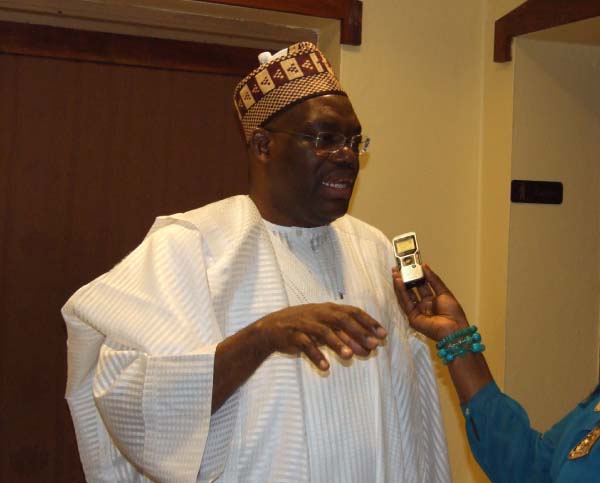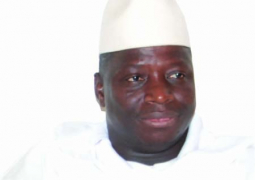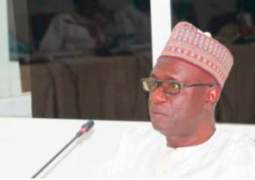
Money laundering is simply the process of making the proceeds of crime to appear to have legitimate origin, and worldwide estimates of the amount of money laundered annually range from US$700 billion to US$1.8 trillion, about 5% of the world’s GDP.Action, therefore, to prevent and combat money laundering and the financing of terrorism responds not only to a moral imperative, but also to an economic need, says Dr Abdullahi Shehu, director general of the Inter-Governmental Action Group Against Money Laundering in West Africa (GIABA), which a week ago held an intensive workshop in The Gambia for accountants on issues of money laundering.
Speaking to The Point in a brief interview, Dr Shehu said the money laundering situation in Africa, however, is under control, driven by the work done by GIABA in the past seven to eight years. Here, following, is excerpts of the interview:
What is the objective of holding a workshop on money laundering for accountants in the sub-region?
Well, as you know, one of the strategic objectives of GIABA is to establish very strong partnership with the civil society including professional bodies like accountants and lawyers. So, on annual basis we organize this programme for the different sectors; this time around is the turn of the accountants and that is why we are holding this workshop in order to sensitize them, especially on the new or revised Financial Action Task Force (FATF) recommendations and also to highlight to them their obligations under the major international standards.
Have you detected some few anomalies as regards money laundering within the community of the accountancy profession, which is also why you decided to do this programme?
Well it is not that somebody has detected something but this is a preventive measure; preventive in the sense that we need to educate those who are supposed to comply with the standards to know their obligations so that if you know that it is your duty to monitor the activities of your clients in a positive way, that would help you to establish a better relationship with your clients and that would also reinforce the confidence of your clients in what you do and the services you provide to your clients.
What is the money laundering situation in Africa?
Well the money laundering situation is under control effectively and particularly with the work we have done in the past seven to eights years. Now in the region there is greater awareness and there is greater commitment and willingness of all sectors of the society to contribute in the prevention and control of money laundering.Initially the accountants did not know what role they would play but we have tried to enhance their knowledge of the acceptance standards and we have also highlighted to them their obligations to report suspicious transactions in the course of their transactions with their clients regardless of the issue of confidentiality and respect to the privacy of their clients. They have demonstrated some commitments to abide by that because that is the only way they can inspire the confidence of their clients to do good business with them
In The Gambia we have about 12 banks and now you are talking about the accountancy sector or profession. With all these and other sectors in play, what would you say is the money laundering situation in The Gambia?
The Gambia is a tourist destination and being a tourist destination, we have to support the government to create a level-playing field for tourists to come. That is not to say we have suspected anybody of untoward behaviour. But we are trying to put in place the necessary preventive mechanisms so that people do not abuse the system that has been put in place in order to attract the tourists.
With regard to the number of banks in The Gambia, it is a welcome development that financial institutions are coming, because one other component of our work is to promote financial inclusion, and financial inclusion requires that there should be more banks in place so that they can provide the banking facilities that would help people to bring money into the financial system. So it is a good thing for banks to come to The Gambia, and all banks must therefore be required to operate under the regulations that have been put in place by The Gambia. So far the reports we have received we have not heard any major infraction and even the minor ones are taking care of by the regulatory authorities in The Gambia. And we shall continue to support those regulators in order to do their work more effectively.
Generally, is there anything unbecoming as regards money laundering you may want to caution in the region?
Well generally you know that money laundering is a derivative crime, a derivative crime because it does not occur until and unless other predicate offences have occurred; whether it is drug, arms or human trafficking, whether it is fraud or corruption, including tax evasion, all these contribute to money laundering. So what we are calling on our members to do is: one, put the necessary mechanisms in place to prevent corruption, because corruption produces a lot of proceeds that require laundering; and two, countries must put in place the necessary mechanisms to ensure that they minimize tax evasion, so that they can increase revenue through their own financial systems; they must also put in place mechanisms to prevent trans-national organised crimes like drug and human trafficking so that there would be a level-playing field, so that there would be enough confidence by the investors to come into a country.
We expect countries to enact and modify legislations that would give assurance to investors that there would be good returns on their investments.
Read Other Articles In Article (Archive)



